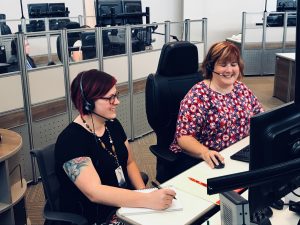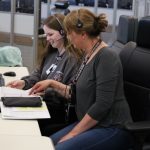Is a Dispatcher Career Right for Me?
A career as a 911 dispatcher is fast-paced, hectic, and above all else, rewarding. As a part of a chain of emergency responders, dispatchers are the face—or the ear—of emergency calls to 911. It takes a remarkable person to do a dispatcher’s work, and it is not suited to everyone.
Before you apply for a dispatcher position, you should decide if emergency services dispatching is right for you. Below, we have taken the guesswork out of your decision by compiling a list of truths about the job so you can better understand if a 911 dispatcher job is right for you.

Dispatching Jobs are Difficult to Get
To qualify to apply for a 911 dispatcher job, you must meet a number of requirements.
These include, but are not limited to:
High school diploma/GED or higher education depending on the service
Speak excellent and clear English and be able to write it as well
Be a proficient problem solver
Knowledge of city, state, and federal laws, regulations, and legal codes
Have experience in transcription and word processing
Be familiar with the geographical service area, which includes the names of waterways, roads, and highways
Have excellent communication skills
Dispatchers Take Lots of Phone Calls
According to the National Emergency Number Association, there are an estimated 240 million calls made to 911 per year in the US. That is over 657,000 phone calls per day. As a 911 dispatcher in St. Joseph County, you will be responsible for answering these calls. In 2020 there were over 200,000 calls for service alone. That doesn’t include admin and other type calls.
Dispatchers Undergo Intensive Training
After you are hired as a 911 dispatcher, you will need to undergo training.
The training includes (but is not limited to):
Call taking
Software (CAD) Training
Geographical training
Other software training
First Aid/AED/CPR
Emergency dispatch
911 Dispatchers are Busy
During a shift, a 911 dispatcher will answer many calls and be required to determine the nature of the emergency while keeping the caller calm, if necessary. The dispatcher will also need to choose the call’s priority (with help from the software), so that the most dire situations are attended to first.
A dispatcher will need to provide the caller with information or instructions, such as guiding a caller through CPR or other life-saving first aid actions. Simultaneously, a dispatcher will need to alert the correct emergency service and dispatch them to the emergency site with full details that will prevent any further danger. The help of Computer Aided Dispatch(CAD) software assists with this, but there is many other multitasking situations to account for.
Finally, a dispatcher must record the information accurately and efficiently so other dispatchers and emergency personnel have the most and best information possible.
Dispatchers Are on Guard While Listening
A 911 dispatcher takes the information from a caller but also listens for nuances and contextual clues. Background noise can provide hints, so an observant 911 dispatcher will be listening to everything going on in a 911 call.
This can be beneficial to the 911 caller, especially in a hostage or domestic violence situation where things cannot always be verbally communicated and helps to keep emergency service personnel safe from additional dangers like guns, explosives, or violent individuals.
Calls Can be Unpleasant
While almost all 911 calls are made to report a crime, fire, illness, or injury, 911 dispatchers are subject to some uncomfortable calls.
People in distress are often panicked and can become verbally abusive. For this reason, a 911 dispatcher must be able to remain level-headed in crisis or when faced with angry or hostile situations.
On the other hand, 911 dispatchers sometimes have to listen to distressing information that can be hard to cope with.
Sometimes Dispatching is Hard
The job isn’t physically demanding, but it can be emotionally and mentally taxing. Some days are worse than others. These are the reasons why specific training deals with some of the more distressing aspects of the job.
Typically, there is a lot of support after a grueling call, but this isn’t always the case, so it is essential for a dispatcher to be aware of their own mental health.
Dispatchers Often are Puzzle Solvers
Problem-solving is a requirement for a job as a 911 dispatcher. You will often be required to solve complicated puzzles because callers are unsure how much information is necessary or don’t know how to relay it in a crisis.
Dispatchers must read between the lines or ask precise questions to get the answers needed to dispatch the correct agency.
A Final Note
If all of the above points have further piqued your interest, you can be sure that a 911 dispatcher job is right for you.
When a 911 dispatcher career is your dream, you will undoubtedly work hard to achieve your goal. It is always important to look at all sides of a job, especially when it is essential to a community.
We hope you are interested in helping your community by being a 911 dispatcher for St. Joseph County, and look forward to having you be a part of our family.













